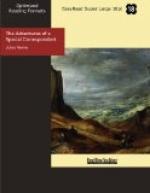It cost a good deal, did this telegram, but you will admit it was well worth its price.
The name of Yen Lou was immediately communicated to our fellow travelers, and it seemed to me that my lord Faruskiar smiled when he heard it.
We left the station at eight o’clock precisely. Forty minutes afterwards we passed near old Merv, and the night being dark I could see nothing of it. There was, however, a fortress with square towers and a wall of some burned bricks, and ruined tombs, and a palace and remains of mosques, and a collection of archaeological things, which would have run to quite two hundred lines of small text.
“Console yourself,” said Major Noltitz. “Your satisfaction could not be complete, for old Merv has been rebuilt four times. If you had seen the fourth town, Bairam Ali of the Persian period, you would not have seen the third, which was Mongol, still less the Musalman village of the second epoch, which was called Sultan Sandjar Kala, and still less the town of the first epoch. That was called by some Iskander Kala, in honor of Alexander the Macedonian, and by others Ghiaour Kala, attributing its foundation to Zoroaster, the founder of the Magian religion, a thousand years before Christ. So I should advise you to put your regrets in the waste-paper basket.”
And that is what I did, as I could do no better with them.
Our train is running northeast. The stations are twenty or thirty versts apart. The names are not shouted, as we make no stop, and I have to discover them on my time-table. Such are Keltchi, Ravina—why this Italian name in this Turkoman province?—Peski, Repetek, etc. We cross the desert, the real desert without a thread of water, where artesian wells have to be sunk to supply the reservoirs along the line.
The major tells me that the engineers experienced immense difficulty in fixing the sandhills on this part of the railway. If the palisades had not been sloped obliquely, like the barbs of a feather, the line would have been covered by the sand to such an extent as to stop the running of the trains. As soon as this region of sandhills had been passed we were again on the level plain on which the rails had been laid so easily.
Gradually my companions go to sleep, and our carriage is transformed into a sleeping car.
I then return to my Roumanian. Ought I to attempt to see him to-night? Undoubtedly; and not only to satisfy a very natural curiosity, but also to calm his anxiety. In fact, knowing his secret is known to the person who spoke to him through the panel of his case, suppose the idea occurred to him to get out at one of the stations, give up his journey, and abandon his attempt to rejoin Mademoiselle Zinca Klork, so as to escape the company’s pursuit? That is possible, after all, and my intervention may have done the poor fellow harm—to say nothing of my losing No. 11, one of the most valuable in my collection.




